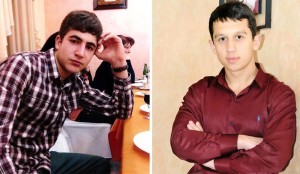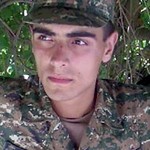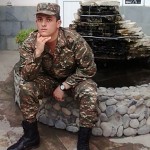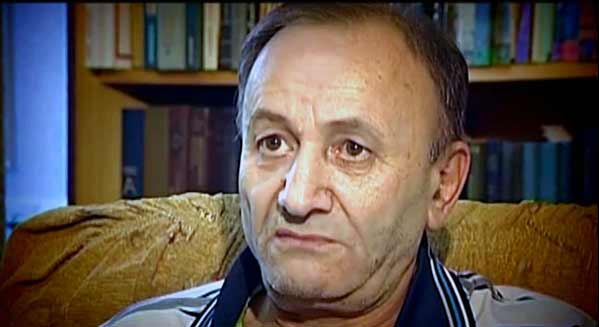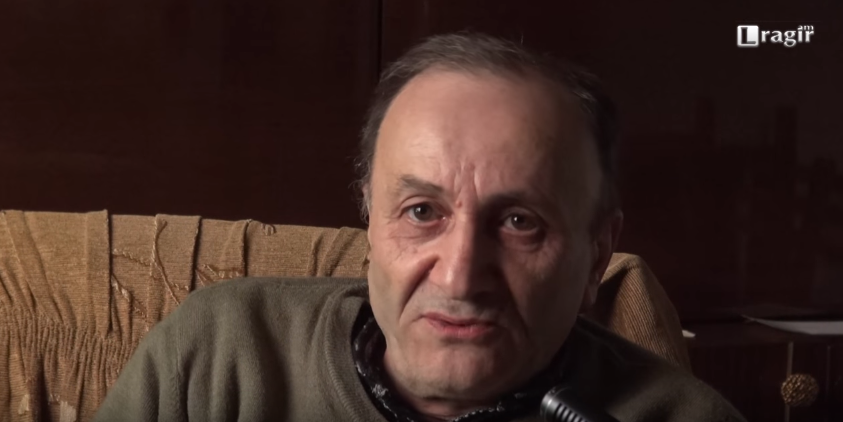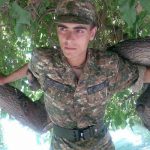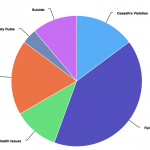Quarterly Report on the Human Rights Situation in the Armenian Armed Forces (Vol.3)
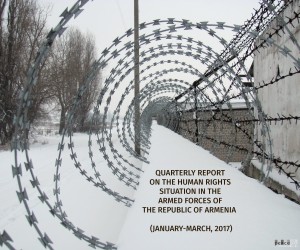
Peace Dialogue is presenting the current issue of its quarterly report on the conditions of Human Rights in the RA Military Forces. Peace Dialogue is an Armenian non-governmental organization active in peace building, democracy and human rights. One of the main spheres of its activities is monitoring of human rights violations in the RA Armed Forces, in pursuit of justice and initiation of public debate on current issues in the Armenian Armed Forces, particularly aimed, but not limited to, at seeking relevant solutions and promoting those solutions by presenting them to the Armenian authorities and relevant international actors. The report is a concise version of the comprehensive information that we publish on our site www.safesoldiers.am. The website is updated regularly.
This report includes current analysis of the organization, court cases and their current status and covers the following topics:
- The issues of Human Rights in the Armed Forces presented in the programs of political parties and coalitions running for the National Assembly.
- Human Rights in the garrison detention cells of the RA Ministry of Defense.
- Fatal incidents in the Armenian Armed Forces January –March 2017.
- Information related to the investigation of private soldiers Grigor Avetisyan’s and Souren Aramyan’s death cases.
- Update on the court case of the death of Private Manuchar Manucharyan
- Update on the court case of the death of Private Haroutyun Hambaryan
- Peace Dialogue’s lawsuit against the Ministry of Defense was removed from suspension.
1. The issues of Human Rights in the Armed Forces presented in the programs of political parties and coalitions running for the National Assembly
The preparation of the Peace Dialogue’s current report on the Human Rights in the Armed Forces coincided with the campaigns of political parties running for the National Assembly. Given the fact that all the political parties one way or another touched upon the issues of the armed forces, we decided, within the framework of this report, to refer to the provisions of electoral programs that discuss the situation of human rights in the armed forces.
Overall 9 political forces (5 parties and 4 party alliances) were running for the National Assambly 2017: The Republican Party of Armenia (RPA), The Armenian Revolutionary Federation (ARF), The Armenian Revival Party, Free Democrats party, the Communist Party of Armenia, as well as “Yelk” (Exit), “Ohanyan-Raffi-Ohanyan”, “Tsarukyan”, and Armenian National Congress (ANC)-People’s party of Armenia alliances.
Five of the political forces the Free Democrats and Armenian Revival parties, Yelk alliance, Ohanyan-Raffi-Oskanyan alliance and Armenian Revolutionary Federation (Dashnaktsutyun) discussed the issues related to the gradual transition to a professional army in their political programs. However, unlike the Free Democrats and Armenian Revival parties, which consider professional army as an alternative to compulsory military service, the Ohanyan-Raffi-Oskanyan alliance and Dashnaktsutyun consider that professional soldiers should be serving together with the soldiers who are undergoing a compulsory military service. Meanwhile, Yelk announced that the contract soldiers will serve a combat duty on the front-line which does not imply the removal of compulsory military service model.
The political program of Yelk alliance stresses mostly the solutions of social issues while referring to the armed forces. The program includes housing for officers, providing civic education to the soldiers in the mandatory military service, recommendations related to improving the quality of food, clothes, and the healthcare in the army. All the political parties one way or another referred to the issues of improving social conditions of the soldiers.
Unlike the other political parties, Free Democrats, Armenian Communist Party and Ohanyan-Raffi-Oskanyan alliance highlighted the need for civilian control over the armed forces. In this context, the ORO alliance emphasizes the importance of strengthening army-society relations and “opening the doors of the army to the civil society and the human rights activists.” It should be noted that one of the founders of the alliance is the former Minister of Defense Seyran Ohanyan, who founded the alliance with two former Foreign Affairs Ministers of Armenia Raffi Hovhannisyan and Vardan Oskanyan. It is noteworthy that during his tenure as the Minister of Defense Seyran Oyanyan signed an executive order that prevented access by the relatives of deceased soldiers and civil society actors to information concerning the non-combat fatal incidents in the military forces.
Both the Republican Party and the ORO alliance stressed the importance of improving the discipline in the armed forces and eliminating hazing among soldiers. It should be noted, that the Free Democrats highlight in a separate provision the importance of revealing the circumstances of death cases of soldiers and officers who died in non-combat situations as well as “a versatile, comprehensive and transparent investigation of omissions and errors of the April war in 2016”.
The Free Democrats have also offered to review the procurement process in the armed forces and establish a better control over it in order to overcome the conversions, abuses and corrupt transactions.
The political program of the Republican Party made a reference to eliminating the corruption risks in the armed forces: when speaking about the security issues in this context the program emphasizes the protection and safeguarding of human life, however in the section referring to the military, there is nothing mentioned about the right to life and the need to improve the human rights situation in general.
The Republican Party, the ORO alliance, Free Democrats and the Armenian Communist Party stressed the importance of procurement and production of armaments, as well as the issues related to upgrading the material and the technical base of the military.
Three of the political forces: the Free Democrats, the Republican Party and the Armenian Communist Party have discussed the issues of Armenia’s participation in military alliances. Moreover, the Free Democrats consider necessary “to review a number of multilateral treaties adopted within the framework of the Collective Security Treaty Organization (CSTO) which have been ratified without mutual respect towards the vital and sensitive security issues of Armenia and requisites for neutralizing the security risks.” (Free Democrats’ program). This political party offers to bring the Armenian Armed forces in compliance with the NATO standards considerably increasing its capacity and efficiency, including through participation in international peacekeeping missions.
At the same time, the Armenian Communist party is proposing to deepen military cooperation with Russia in the framework of the CSTO, while the Republican Party wants Armenia to consistently contribute to the further strengthening of the CSTO.
In should be noted that the Tsarukyan alliance has not addressed the issues in the armed forces in their program at all, while the coalition of Armenian National Congress and People’s Party of Armenia (ANC-PPA) sees the solution to the problems in the Armenian army through the peaceful resolution of NK conflict and reconciliation with Azerbaijan. In the program of this political force it is particularly mentioned that the reconciliation will end the death of hundreds of soldiers on the front-line and civilians. Moreover it will stop the arms race and will significantly reduce the burden of military spending that is 4-5% of the GDP at the present.
Based on the foregoing, it can be stated that most of the political parties that were involved in the political race did not touch upon the issues in the armed forces in terms of human rights protection or did not allocate enough space in their program for the legal aspects of the issue. Taking into consideration the fact that some of the political forces and their leaders have had the political power and opportunities to carry out actions aimed at improving the human rights in the armed forces, it should be noted that very few of them have taken serious practical steps in this direction during their tenure. Therefore, the impression is that many of the political forces referred to the issues in the army in a populist manner in their programs simply to attract more voters.
P.S. By the time the report was oubkushed, four of the mentioned political forces had passed the minimum threshold for entering the National Assembly: the Republican Party, Tsarukyan alliance, Yelk alliance and the Armenian Revolutionary Federation (Dashnaktsutyun).
2. Human Rights in the garrison detention cells of the RA Ministry of Defense
In the previous quarterly report of Peace Dialogue NGO on the Human Rights Violations in the RA Military Forces a reference was made to the issues in the garrison detention cells of the RA Ministry of Defense. Following the report we received a clarification from the Ministry of Defense reading that “according to the RA Criminal Code those soldiers are kept in the RA MoD Militray Police garrison cells who were arrested under a criminal case (up to 72 hours), the soldier against whom arrest was selected as a preventive measure and convicted soldiers (15 days to 3 months)”.
In its 2010 Report after the visit to Armenia, in the paragraph Military Establishments the European Committee for the Prevention of Torture and Inhuman or Degrading Treatment or Punishment (CPT) recommended to the Armenian authorities to ensure that the detained persons are transferred to the prison as soon as possible and while the arrested servicemen are transferred to the detention facility their interrogation by the military police is carried out in prison if possible.
In its 2015 Report after the visit to Armenia in the paragraph Military Establishments the CPT expressed its satisfaction by “…the monitoring mechanisms carried out in the detention facilities for the detained soldiers by the independent bodies.”
In its 2010 report the CPT noted that the civil society representatives were granted access to these facilities in the framework of a specific monitoring program, however, the Military Police initially sent a prior notice about their visits. The CPT stressed that, to be fully effective, visits by monitoring groups should be both frequent and unannounced.
Based on the CPT recommendations, Peace Dialogue NGO sent an inquiry to the Ministry of Defense requesting the following information:
- What concept is there for the civil society representatives for implementing monitoring in the military institutions?
- What actions have been carried out by the RA MoD in order to develop a system of visits to the military facilities mentioned by the CPT?
- To what extent were the CPT recommendations taken into consideration while drafting the action plan of the RA Ministry of Defense for the Human Rights protection for the period 2017-2019?
On February 3, 2017 Peace Dialogue NGO received a response letter from the RA MoD Information and Public Relations Department which specifically mentioned:
“… taking into consideration the CPT recommendations, as well as guided by the RA Legislation, the question requiring public supervision in the facilities for arrested and detained people by the monitoring group was included in the draft program of the RA Human Rights Strategy Action Plan 2017-2019.”
However, it is not clear from that response whether there is a concept designed for the civil society representatives for implementing monitoring in the military institutions and on what bases the previous visits by the monitoring groups were organized in the RA MoD facilities for arrested and detained people as noted by the CPT Report 2010.
3. The death cases recorded in the Armenian Armed Forces for the period January-March 2017
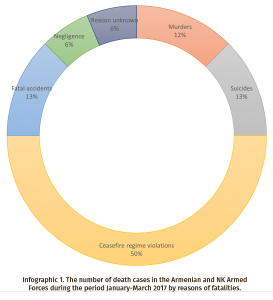
In the relatively young Armenian army, the human rights situation, particularly the right to life, remains one of the major issues of concern for the human rights defenders. In their reports different organizations mentioned about the high level of mortality among the soldiers and expressed their concern over the recurring violations, violence, and inaction of the military investigative bodies and several responsible military bodies.
The Armenian human rights activists estimated that since the ceasefire agreement signed in 1994 more than 1500 young peo-ple died in the Armenian army, whereas during the whole duration of the NK war nearly 6000 people were killed from the Armenian side. In a recent research carried out by Ani research center, expert T. Hakobyan noted (The provided link is in Armenian):
“According to my re-search the total number of the losses from the Armenian side throughout the military actions between Armenia and Azerbaijan is 6.500. This number includes the period of 26 years- from 1990 to 2016-including the four-day war in April 2016.”
Our organization has managed to compile detailed information on the causes and circumstances of nearly 980 non-combat death cases which is available on our website www.safesoldiers.am.
In the first quarter of 2017, we compiled information about 16 death cases, just as much as it was reported in the same period last year. The ceasefire regime violations were eight (8), three times more than last year during the same period of time.
Among the reported cases, there were two (2) suicides, two (2) murders, two (2) fatal accidents, one (1) death case caused by negligence and one (1) more death case the cause of which is not known yet.
4. Information related to the investigation of private soldiers Grigor Avetisyan’s and Souren Aramyan’s death cases.
According to the official hypothesis on April 6, 2016, the bodies of two private soldiers Grigor Avetisyan and Suren Aramyan were found with gunshot wounds at the artillery firing range of the N military unit. A criminal Case was initiated by the 5th garrison division of the RA Investigative Committee under Article 104, Part 2, point 1 and 6 of the RA Criminal Code.
According to the families, the investigation that has been carried out in the double murder case of their sons during the last eight months was biased, erroneous and illegal. Grigor Avetisyan’s father Hermon Avetisyan said that there were a few factors that made him suspicious:
“In the evening of the day of the incident I was informed that my son’s body was being transferred from the combat post to Vardenis hospital. I left for Vardenis in order to accompany my son’s body. While I was standing in front of the hospital I noticed a white Niva model car in front of the hospital. When the driver of the car, a person in Military Police uniform who was unknown to me, opened the trunk of the car I noticed a few rifle guns in it. I went closer and saw five rifle guns in the trunk. They were without packaging and without a seal, they were laying there all open. I also noticed that one of the rifles had gunshot traces on it – there were bullet holes in the stock of the rifle, another gunshot hole was noticeable on the right of the metal casing and that part of the weapon was damaged. Taking into consideration that I had already heard that my son was murdered by a number of gunshot wounds, I immediately guessed that it was my son’s weapon. To clarify my doubts, I asked the above mentioned officer if it was my son Girgor’s weapon. He was not surprised by my question and only answered evasively that he did not know. When I received the ballistic and trace report #16551603 from the investigator to which there were photos attached of my son’s AKM model rifle (rifle number ЯЛ-1486), I realized that I saw the same traces on the rifle that was in the trunk of the Niva model car. However, to my surprise, the experts were given not the five rifles which I saw in Vardenis, but only four of them: the fifth rifle had vanished somehow.”
According to the official letter from the investigator, soldier Davit Doumikyan turned himself to the Vardenis Military Police two days following the double murder and confessed that he murdered Avetisyan and Aramyan. However, according to the information that the aggrieved party received, Doumikyan withdrew his confessions later on announcing that “a tall colonel” extorted those testimonies from him.
The investigative body kept Davit Doumikyan in detention for almost a year accusing him of killing the two soldiers.
In March 2017, the investigative body, first verbally and then in a writing, informed the victim’s relatives that a section was separated from the double murder case of Gregory Avetisyan and Suren Aramyan which must be sent to trial.
According to Peace Dialogue NGO expert Rouben Martirosyan that decision is illegal because it contradicts Article 28, part 2 of the RA Criminal Procedure Code, according to which it is necessary to maintain the integrity and objectivity of the case (“Separation of a criminal case against persons involved in one or several crimes is done by decision of the investigator, the prosecutor or the court, when this is necessary based on the facts of the case and can not affect the completeness and objectivity of the case.”).
In fact, the investigative body illegally separates with that decision one complete crime, which occurred on the same day, at the same time, in the same place and by the same group of people this way attempting to conceal the real motives for the murders of two soldiers and the perpetrators.
The preliminary investigative body arbitrarily interprets the “confession testimonies” of Davit Doumikyan, who “turned himself into” the police after the double murder, accepting his confession regarding the murder of one of the soldiers as true, while regarding the murder of the other soldier as inaccurate.
The preliminary investigative body considered “proven” the fact that Doumikyan killed Gregory Avetisyan but did not be consider proven that he also killed Suren Aramyan, therefore it separated the part of Grigor Avetisyan’s murder and is going to send it to the court, although Dumikyan withdrew his confessions.
The investigative body tries to “prove” that allegedly late G. Avetisyan fired a few shots; however it is unable to answer the question of who put a bullet case with 30 bullets in the gun attached to Avetisyan.
The preliminary investigative body considered proven that allegedly late Souren Aramyan was murdered while he was in the trench but it is unable to explain the fact that shots were fired from his gun during the incident.
The authors of N 16551603 expert opinions, A. Hambardzumyan and K. Abrayamyan examining G. Avetisyan’s and S. Aramyan’s clothes found different mechanical damages to the clothes, however there was nothing mentioned about these damages in the “Conclusions” section of their report.
The aggrieved party is convinced that this fraud is the result of an illegal conspiracy between the experts and the preliminary investigative body because the latter persistently rejected the motions of the aggrieved party to send the deceased soldiers’ clothes for forensic examination.
The aggrieved party’s petition to have victim’s successor Hermon Avetisyan’s inquiry “Report about a crime” examined by the Special Investigation Service still remains unanswered.
The mentioned illegalities committed by the investigation body are driven by an “acute need”: on April 6 marks the deadline for keeping Doumikyan under arrest. Under Artciel 138 of the RA Criminal Procedure Code.
It is not prescribed to keep the suspect under custody for more than a year, therefore if Doumikyan is freed either the case will collapse or it should be sent to Court.
Perhaps the above is the reason why the victim’s successors have not been provided with the information and the copies of the decisions prescribed by law in order to prevent them to make motions.
They were verbally informed that only one week will be given to them to become acquainted with the 7-volume case and make motions.
The allocated time is not reasonably enough for getting acquainted with the voluminous case, examine the contradictions and make motions.
5. Update on the court case of the death of Private Manuchar Manucharyan
According to the official version on July 31, 2013 at approximately 1:40 pm. Private Manuchar Meruzhan Manucharyan (Born in 1994, drafted in spring 2012 from Vanadzor commissariat, serving at military unit # 24923 located in Kanaker) while on service on the watchtower, shot himself to the chin three times from 5.54 mm rifle gun and died instantly.
The aggrieved party in Manuchar Manucharyan’s case (according to the official hypothesis “suicide”) has been waiting for the new posthumous forensic medical examination results for nine months already. It is still not clear what examination report will be provided by the same examination center since they are the “authors” of the first examination report.
A reasonable time period is not regulated in Armenia which must be provided to the experts for making an expert conclusion. We think the experts often abuse this gap in the law and Manuchar Manucharyan’s case is a vivid example of this: the parties have been waiting for the expert opinion for nine months already. Reminder: it took only two months for completing the first examination report.
6. Update on the court case of the death of Private Haroutyun Hambaryan
Peace Dialogue NGO continues to represent the interests of the victim’s successor at court in the murder case of Harutyunyan Hambarian. According to the official hypothesis private Haroutyun Hambaryan shot himself to the forehead on May 8, 2015 from a rifle gun attached to him and died immediately. The same day the 3rd garrison devision of the RA Investigative Committee initiated a criminal case and an investigative group was formed.
In the first quarter of the 2017 the Syunik Court of First Instance issued two decisions connected with the case of Hambaryan.
The aggrieved party filed a number of motions, which had arguments that proved that a biased investigation was carried out and as a result, the intentional murder was presented as a suicide. The Court has taken into account 14 of the motions and accepted 12 of them. PD expert Ruben Martirosyan who is the representative of the aggrieved party thinks that the Court, overall, made an objective decision.
The injured party also filed a complaint, requesting the Court to make a decision on the duties of the prosecution body: the prosecution body are to eliminate violations of the aggrieved parties rights and freedoms caused by the decision of the deputy head of the 3rd garrison division of the RA Investigative committee.
According to this decision no criminal prosecution was initiated over the fact of driving the victim to suicide.
The Court examined the complaint and decided that the complaint is justified and recorded violations of rights and freedoms of the victim and his successor.
The Court obliged the investigative body to eliminate the violations recorded in the decision.
The aggrieved party is planning to present another motion connected with the decoding of the documents provided by Karabakh Telekom which are included in the criminal case and also were provided to the aggrieved party. Moreover, R. Martirosyan is convinced important parts of the material are missing.
7. Peace Dialogue’s lawsuit against the Ministry of Defense was removed from suspension
On March 7, 2017, the RA Administrative Court has re-launched the hearings of Peace Dialogue NGO’s lawsuit against the RA MoD requesting to oblige the Minister of Defense to provide the requested information.
Reminder: In 2014 Peace Dialogue NGO applied to the RA Minister of Defense requesting that the ministry provides official information on the death of soldiers for the period of 1994-2014, including the full names of the deceased soldiers, the location of the incidents, the dates, the unit numbers, the respective unit commander’s full names and ranks, the cause of death and a brief description of the incident. However, no answer was given to that inquiry. Peace Dialogue filed a lawsuit at the Administrative Court based on the paragraph that guarantees seeking, receiving and imparting information and based on the norms of the Law on Freedom of Information and requesting to oblige the Minister of Defense to provide the information requested in an inquiry dated 07/11/2014.
During the court proceedings dated 12/08/2015 the Ministry of Defense filed a motion to suspend the administrative proceedings and invoked as a ground for rejection Point 42 and 43 of the executive order N9 of the Minister of Defense dated 09/07/2015.
- The incidents in the Armed Forces, as well as the information revealing their causes are considered classified information, based on the level of their secrecy and given the changes in the political and operative situation of the country;
- Information revealing the investigation materials regarding the infringements in the Armed Forces is considered classified information, based on the level of their secrecy.
With an initiative of Peace Dialogue the trial of the lawsuit was temporarily suspended in order to challenge the jurisdiction of the executive order N9 of the Minister of Defense.
It should be noted that after exhausting all the remedies, the organization has sent an appeal to the European Court of Human Rights (ECHR). After the appeal to the ECHR the organization filed a motion to have the case removed from suspension.
 Download Quarterly Report on the human rights situation in the Armed Forces of the Republic of Armenia (Vol.3) (pdf, 238 kB)
Download Quarterly Report on the human rights situation in the Armed Forces of the Republic of Armenia (Vol.3) (pdf, 238 kB)
Posted 15 April, 2017

